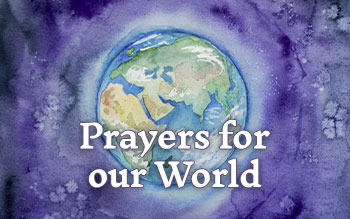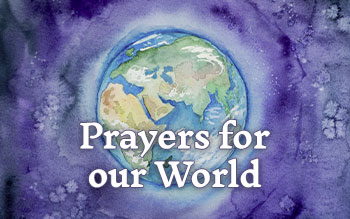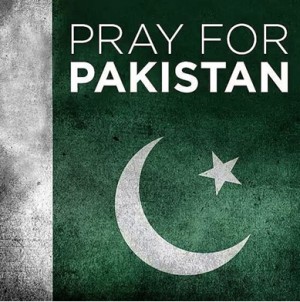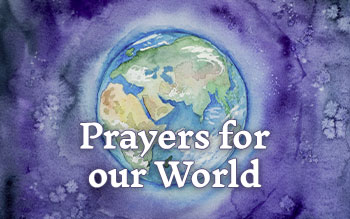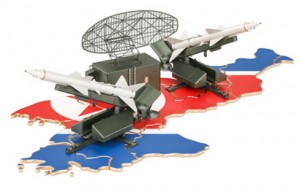Displaying items by tag: Asia
Syria: Putin vows to rebuild Syria’s faith communities
President Putin told representatives of the Russian Orthodox Church: ‘Over the past few years the Russian state, alongside the Russian Orthodox Church and other religious organisations, has provided humanitarian aid to Syria. It is very important that peaceful life is re-established as soon as possible, so that people can return and begin rebuilding churches and temples.’ Putin also stressed that most of the historically Christian areas have been liberated. Syria’s Christian community, one of the oldest in the world, has shrunk from 30% to an estimated 10% of the population, after being driven from their homes or forced to convert to Islam. Syrian Christians lived in Syria for centuries before Assad, but only reached the highest levels of government when Syria was democratic. Despite being a minority they have long belonged to Syria's elite, and joined prominent political groups.
Indonesia: new eruption threat
In September we reported that 122,500 people had been evacuated to locations outside a 7.5-mile exclusion area around Bali's Mount Agung volcano as magma rose during hundreds of daily tremors (see ). On 25 November thousands were evacuating an area within 8-10 kilometres from the peak as lava began to appear. The next day most people had fled but some have remained, despite plumes of smoke and visible lava. They are too frail or sick to move. If Agung erupts again, they will die when fire and rocks rain down and boiling lava flows. Many of the people forced to evacuate their homes are the poorest in Bali. Farmers and construction workers will find it hard to earn money while living in the camps to which they have been evacuated. No one knows when they will be able to return to their villages; financial pressures may force some to go home before the danger has passed.
Myanmar: humanitarian crisis
Aid agencies are appealing for food, medicine, and construction materials for shelters as the latest round of violence against Rohingyas continues. One agency writes, ‘The situation constantly changes; we are delivering long-term aid within Myanmar for the Rohingya community. We also have teams in neighbouring Bangladesh to support those fleeing violence.’ Pope Francis, on a four-day visit to Myanmar, did not publicly mention the plight of the Rohingya by name. Khin Maung Myint, a Rohingya activist, said he was disappointed: ‘not in Pope Francis, but in the advisers who have dissuaded him from bringing up the plight of the Rohingya people.’ The Pope talked about forgiveness and ignoring the desire for revenge, without mentioning the violence, gang-rape, massacres and arson against the Rohingya.
Pakistan: a missionary’s message
‘Nawaz Sharif has been ousted from government several times, but he has returned to Pakistan, leaving his wife in an English hospital dying of cancer. The High Court ousted him on corruption charges, and he is banned from taking any political office; but his party (the major party) have changed the parliament’s constitution so that Nawaz can become its president. They also passed a stricter Islamic law, making it much harder for Christians and other minorities. The present temporary prime minister has little backing. There is no control in the country. Terrorists are crossing back and forward across the border. When US secretary of state Rex Tillerson came to meet Pakistan’s military on the Afghan situation, he was undercut by Pakistan’s government who demanded that he speak to it only. The military is held in favour by much of the populace.’
Abandoned Devotions Conference (Chiang Mai, Thailand)
“If you are a Christian leader, you would undoubtedly be blessed at this conference!
The deepening of the spiritual life, and it’s resulting vitality, is a keynote message that the Holy Spirit is trumpeting throughout the earth today.” - Edmund Chan Leadership Mentor, Covenant EFC, Singapore/Founder, Global Alliance of IDMC
Focus areas include:
* Abandoned Devotion to Jesus - The Key To Fulfilling The Great Commission
* Being Saturated with the Powerful Presence of God
* Pursuing the fullness of the Spirit: The Divine Factor in Mission
* The Surrendered Life: The Indispensable Factor in Mission
* Enjoyable Prayer To Fuel Mission
* Becoming Bible-Centered Leaders in The Great Commission
Speakers include:
Dr. ThuoMburu (Kenya)
Remo Paul (India)
Graham Wells (USA)
Joel Iyorwa (Nigeria)
Kelly Shaw (Thailand)
Ryan Shaw (Thailand)
Worship by Julio & Noemi Vallejos (Argentina)
Find all Conference info and register at www.svm2.net
Or contact Rita Chiu +66-99-371-5531 Email: This email address is being protected from spambots. You need JavaScript enabled to view it.
Saudi Arabia - Is a door opening?
Is a Door Opening for Christianity in Saudi Arabia?
(Worthy News) - Stunning political developments in Saudi Arabia have some wondering if the strict Muslim-ruled Kingdom could become more tolerant of Christianity.
Saudi Crown Prince Mohammad bin Salman has said he intends to return Saudi Arabia to "moderate Islam" and open the country to all faiths.
As part of his reform drive, dozens of officials – including 11 princes – have been arrested on corruption charges. The kingdom also says it has dismissed several thousand imams from mosques for spreading extremism.
The percentage of Saudi Arabian citizens who are Christians today is officially zero, because conversion from Islam to Christianity has long been punishable by death.
But it's estimated that between four and five percent of the population is Christian – mostly guest workers who are not allowed to worship openly.
Some are hopeful that change is coming.
"The days of a religious monopoly in Saudi Arabia are over," says Christian Palestinian journalist Daoud Kuttab to Christianity Today, "No more pushing Islam down every citizen's throat."
Andrea Zaki, president of the Protestant Churches of Egypt, said of the reform promises, "I hope it will lead Saudi Arabia and the region to a more open society."
But time will tell whether Prince Mohammed can bring real reform and religious pluralism to a nation that has known little to none of it since its founding.
More: http://www1.cbn.com/cbnnews/world/2017/november/is-a-door-opening-for-christianity-in-saudi-arabia
Qatar's Qaradawi Problem
Earlier this year, President Donald Trump accused Qatar of funding and promoting terrorism all over the world.
“Qatar has funded terrorism at a very high level,” he said, and it seems many in the White House shared his view.
Former White House Chief Strategist Steve Bannon had this to say about Qatar during a discussion at The Hudson Institute this week: “I don’t think it was just by happenstance that two weeks after the summit (in Riyadh) that we saw the blockade by the United Arab Emirates and Bahrain and Egypt and the king of Saudi Arabia on Qatar.”
Bannon also said repeatedly in his remarks that the Qatar situation was more important than the crisis in North Korea.
“I think the single most important thing that’s happening in the world is the situation in Qatar,” he said, expressing his support for the blockade.
Bannon was joined at the event by former U.S. Secretary of Defense Leon Panetta and CIA Director Robert Petraeus, both of whom also expressed concern about Qatar’s ties to terrorism, terror financing, and some of the Islamic world’s hate preachers.
Exhibit A is Yusuf Al-Qaradawi, the Egyptian-born cleric and religious leader who is now a Qatari citizen and has used Al-Jazeera, Qatar’s state-funded media outlet, to spread a message of hate across much of the Middle East.
If the Trump administration hopes to help end the ongoing blockade on Qatar, then it must pressure the Gulf nation to distance itself from hate preachers, especially Qaradawi, and allow him and others on the list to face consequences.
For many years Qaradawi’s talk show on Al Jazeera has condoned and encouraged suicide bombings especially against Israelis. The controversial preacher has endorsed Hitler and the attempted genocide of the Jewish people throughout history.
“The last punishment was carried out by Hitler. By means of all the things he did to them — even though they exaggerated this issue — he managed to put them in their place,” he has said. “This was divine punishment for them.”
Qaradawi has also suggested that homosexuals should be punished either by being burned or thrown off a building. The Islamic State group put his theories into practice when it chose to execute gay men in that very way.
Qaradawi’s views have resulted in bans on Qatari citizens entering several countries, including the United States, the United Kingdom, Tunisia and France.
In many ways his personal fortunes reflect those of the emirate of Qatar which he now calls home. Not long ago he was respected across the globe; now he is an international pariah.
Qaradawi is also on a list created by Saudi Arabia, UAE, Bahrain and Egypt of 59 people and 12 Qatari entities that are accused of promoting terror. Qatar has also repeatedly ignored extradition requests for Qaradawi from Egypt that began in 2015 when the cleric called for jihad in Egypt after the ouster of the Muslim Brotherhood.
Since the beginning of the crisis, Qatar has not backed down from its love for Qaradawi; he even attended a Ramadan dinner with Qatar’s ruling emir.
Qatar must also disavow Qaradawi and cast out such “religious leaders” if they want to once again be viewed as a reliable anti-terror partner. Qaradawi is not merely an example of Qatar’s support for terrorism; he is a reflection of what unchecked and unchallenged religious authority looks like, and his support for terrorists like Hamas and the Muslim Brotherhood, his calls for violence, “resistance” and jihad must be opposed by all those who favor freedom, peace and justice.
Some of the demands on Qatar — such as shutting down Al-Jazeera — may be unrealistic but if Qatar really wants the rest of the world to believe it opposes terrorism, it could start by deporting one of its most fervent endorsers.
Lianne Hikind is a professional writer in Florida and small business owner. She has been previously published by the Media Research Center and the Times of Israel. She was formerly on the board of Great Things for Israel.
The views expressed in this opinion article are solely those of their author and are not necessarily either shared or endorsed by the owners of this website.
By: Lianne Hikind on October 31, 2017 at 3:35pm
CONTINUED FOCUSED PRAYER FOR CHRISTIANS IN QATAR
Christians in Qatar are requesting prayers for the current diplomatic crisis their country is in. A growing number of other Arab countries have cut all ties with Qatar. The future for Qatar and its hundreds of thousands of migrant workers – tens of thousands of those being Christian believers – is unclear.
Open Doors spoke to several Christian believers living in Qatar. All of them asked for prayers for the developing situation. Saudi Arabia, UAE, Bahrain, Egypt, Yemen and other smaller states have severed diplomatic ties with Qatar over its alleged support for Islamist groups. “Let’s just pray this problem will not escalate further… that they will be able to settle their differences,” one believer from an Asian country said.
Up until now, the diplomatic crisis is not the biggest problem for the Christians. “Life goes on, almost normal,” another Christian leader puts it. “For us believers, life is same as last week, but do pray for our safety. There are crowds in the supermarkets because people are scared and are buying food to stock up.”
This leader points out that there have been special prayer gatherings by Christians to intercede for the leaders in Qatar and its neighboring countries. “Because of Ramadan, the holy month of fasting for the Muslims, most of the companies have cut the working hours by 50 percent. Also, Christian workers only have to work half days, so they have more time go to church and to pray.”
Another believer asked for prayers to be focused on peace, “That pride will not stand in the way of resolution; in essence: God’s will for the situation.”
An Open Doors worker expresses the hope that something good comes from this crisis: “Many Christians in Qatar already live with strict limitations to express their faith, and extra pressure on them is not what we want. But hopefully the current media attention on Qatar sparks people to pray for the country and the people living and working there.”
PRAY THAT ALL PARTNERS WILL WORK TOGETHER TOWARD COMMON SOLUTIONS THAT ENABLE SECURITY AND STABILITY IN THE REGION
More: https://www.westernjournalism.com/qatars-qaradawi-problem/
Pray for Pakistan (Nov 2017)
Open their eyes and turn them from darkness to light, and from the power of Satan to God, so that they may receive forgiveness of sins and a place among those who are sanctified by faith in me.’ Acts 26:18
Unbelievable things are happening in Pakistan; there is turmoil in the government. Nawaz Sharif returned to Pakistan, even though his wife is in the hospital in England dying of cancer. The High Court, as the highest authority in the country, ousted him on corruption charges. This is the third time he has been ousted and he is banned from taking any political office. His party is the major party; they have just changed the constitution in the parliament so that Nawaz can become president of the party. To try and make people happy, along with it they passed a stricter Islamic law that will make it much harder for Christians and other minorities.
The opposition groups, through their demonstrations, have virtually closed down the streets in Islamabad, the capital. They are being told to back down or a clash will come in the next day or two. The present Prime Minster who holds a temporary position had to come from the majority party which is Nawaz’s party, but he has little backing from his own party. He really has no power and there is no control in the country.
For example, last time we prayed for US Secretary of State Rex Tillerson’s trip to Pakistan. He was to mainly meet with the military on the Afghanistan situation. He was kind of undercut by the present government who demanded to be the spokesperson to talk to him. The meeting did not go well.
General Votel, America’s Central Command, has made four trips to Pakistan to try and repair some of what was said. This is in preparation for US Defense Secretary James Mattis’ expected trip to Pakistan next month. For the first time Gen. Votel said both America and Pakistan have a part to play in stopping terrorists from moving back and forth across the border.
PRAISE God for this truth. It is an impossible task unless both sides take part. There always has been quite a clash between Nawaz and the military. The military has done a lot with its last two leaders in taking out terrorists. The military is well liked by the people. When things have really gotten bad in Pakistan the military has usually had to take over. The question is will American allow the military to take over. This is a very MIXED up situation.
HOW DO WE PRAY
Pray: for Nawaz, who has been voted out, to leave without destroying the country.
Pray: for the clash that is coming between opposition groups and the authorities.
Pray: 'May God intervene'. There are positives and negatives on both sides.
Pray: for America’s position in all of this. For Gen. Votel and Gen. James Mattis of America to be able to meet with the military. For better understanding between both sides.
Pray: that Christians will not be suppressed even more.
Pray: for preparations for a prayer team going to Pakistan. One person has received his visa. Places to stay have been worked out.
Pray4Pakistan
North Korea 'devastating' EMP Threat
Only a few weeks after a team of experts warned Congress that the nation faces an “existential threat” from North Korea from a possible electromagnetic pulse attack, a new report says the rogue nation is mapping a specific plan.
Paul Bedard at the Washington Examiner wrote in his “Washington Secrets” column that the White House “is being warned that North Korea is mapping plans for a ‘devastating’ attack on the United States with an atmospheric nuclear explosion that would disable the nation’s electric grid, potentially leading to the deaths of virtually all impacted.”
He said President Trump “is being urged to create a special commission to tackle the potential for an electromagnetic pulse attack, one similar to the iconic Manhattan Project.”
Bedard cited Marine Corps veteran Tommy Waller, an advocate for an EMP commission, now the director of special projects at the Center for Security Policy.
“The first and foremost thing he must write is an executive order establishing his own EMP commission in the White House – a task force that draws from the experience of the previous EMP Commission,” Waller wrote.
Waller said that after “massive intelligence failures grossly underestimating North Korea’s long-range missile capabilities, number of nuclear weapons, warhead miniaturization, and proximity to an H-Bomb, the biggest North Korean threat to the U.S. remains unacknowledged – nuclear EMP attack.”
“North Korea confirmed the EMP Commission’s assessment by testing an H-Bomb that could make a devastating EMP attack, and in its official public statement: ‘The H-Bomb, the explosive power of which is adjustable from tens of kilotons to hundreds of kilotons, is a multi-functional thermonuclear weapon with great destructive power which can be detonated even at high altitudes for super-powerful EMP attack according to strategic goals.'”
One of those experts who delivered the warning to Congress, Peter Pry, told WND it is the deep state, entrenched bureaucrats whose loyalties likely lay with a previous administration, that is indifferent to a threat that testimony has confirmed could kill 90 percent of the people in the affected region within a year.
Get the real story about EMP in the ground-breaking “A Nation Forsaken” by F. Michael Maloof, as well as “Lights On” by Jeffrey Yago, from the WND Superstore.
Pry, a nuclear strategist formerly with the CIA who served as chief of staff of the Congressional EMP Commission until it was terminated in September (the same month North Korea tested a hydrogen bomb, which it described as capable of a super powerful EMP attack), said liberal Democrats still are running a lot of Washington even after President Trump’s election.
“The people who sabotaged the EMP Commission, Obama holdovers, are still at the Department of Defense. They have not been replaced by the Trump administration. This is happening not just with the vitally important EMP Commission,” he said. “Our society, the Trump administration and the people who voted for Trump are paying for the failure of Congress to support Trump appointees quickly.
“At the same time during the Obama administration, he had twice as many appointees appointed to positions in government than Trump has. It’s not President Trump’s fault – these people are undermining and opposing the policies that President Trump has enacted, including the case of the EMP Commission.”
Pry explained Obama administration bureaucrats, who believed Hillary Clinton would win the 2016 presidential election, did everything they could to sabotage and undermine the commission.
“They held back money for a whole year. They held back security clearances. They tried to stop the commission’s staff from working, arguing that ‘you need a contract in order to work for the EMP Commission.’ They wouldn’t even let me work, or other staff, pro-bono. We did anyway.
“Had Hillary won, we would never have received any of our funding or security clearances. It was all after she clearly lost and Congress intervened that they relented at the last minute. A commission that was supposed to have been able to work 18 months at EMP ended up with resources and support from the Department of Defense that enabled us to put in six months of work. That’s no way to provide for the national security of the country against an existential threat like EMP.”
An EMP comes from a nuclear explosion at altitude over the United States. The blast would disrupt electronics in line of sight, including those computer and other systems that deliver food, fuel, energy and communications to Americans.
Further, repairing or replacing those systems easily could take months, or even longer.
The result would be a run on food currently in stores, and starvation when those supplies failed, as replacements would be impossible without those delivery systems.
Pry detailed how an EMP attack would be more devastating than an asteroid hitting.
“We have a population of 320 million Americans today – we are only able to sustain that population because of our technology. Our modern technological economy and all of our critical infrastructure that support that economy is keeping 320 million Americans alive,” he explained. “Communication, transportation, business and finance, our industrial capability, even food and water depend on electricity. When you subtract electricity, when you cause a nationwide blackout, blackout the electric grid and all the life-sustaining critical infrastructures, how can you now support 320 million people? How many people can you support?”
Pry said many downplay the threat of an EMP attack by claiming the conditions resulting from the attack would be similar to “time traveling” to a time when people were less dependent on electricity. But in reality, he warned, the “aftermath of an EMP would be an unprecedented environmental catastrophe.”
There would be a ripple effect to the problem, too.
“Gas line pipes are going to blow up – you’ll have firestorms in cities from exploding gas pipelines. Chemical spills, toxic clouds industrial accidents, where fires break out because of the failure of safety … systems,” he said. “This huge chemistry set that is our society isn’t just going to sit there and black out; in many cases, it’s going to detonate and basically turn into bombs. In seven days, the nuclear reactors will go Fukushima and spread radioactivity everywhere.”
Jeffrey Yago, a licensed engineer and certified energy professional, says the danger of an EMP attack is very real.
“I think in the future of this country, we’re going to certainly see not only more power outages in more areas, but they’re going to last a lot longer,” Yago said during an interview on The Hagmann Report. “I’m not talking about a two-day outage [caused] by a storm or a weeklong outage by something like Hurricane Sandy or Katrina, but we’re talking potentially, these problems could impact major parts of the United States for months, not days.”
Yago believes if America continues on its current path of escalating tensions with North Korea, an EMP attack will be imminent. He suspects China, North Korea’s biggest ally, would rather see North Korea attack the U.S. with an EMP weapon than with a more conventional nuclear missile. A nuclear missile would destroy buildings and other infrastructure that China, the U.S.’s largest foreign creditor, may hope to own one day. An EMP attack would destroy America’s electrical grid while leaving other critical infrastructure intact.
Plenty of experts in the public and private sectors are aware of the EMP threat to America’s power grid. Multiple studies have been published, including “Securing the U.S. Electrical Grid” by the Center for the Study of the Presidency and Congress in 2014, “Electric Grid Vulnerability” by the staff of two Democratic congressmen in 2013, and “Large Power Transformers and the U.S. Electric Grid” by the U.S. Department of Energy in 2012.
Get the real story about EMP in the ground-breaking “A Nation Forsaken” by F. Michael Maloof, as well as “Lights On” by Jeffrey Yago, from the WND Superstore.
North Korea Further Briefing (Dec 2017)
I trust you have been following the news about the current threat from North Korea that could impact both Asia and North America, especially if Kim Jong Un, fires another ICBM and accidentally hits Japan or South Korea, prompting retaliation and war, or shoots a nuke a couple hundred miles above North America in what is called an EMP or electro-magnetic pulse attack that could knock out power grids and put the lives of millions in the continent at stake.
Please see the article below and pray for a wall of protection around the countries of Asia and North America. The Psalmist reminds us over and over that the Lord is the one who protects our nations. He is our only security in the final analysis. He is our "strength and shield", "a fortress of salvation" and hears our cry for mercy (28:6-8) so let's pray accordingly in this tense time.
I was in Washington DC last week and met with one of the USA's national security people who is an expert on North Korea also a woman of prayer. She said the crisis is likely to get "more intense" and that we should pray there will be no miscalculation on either side. Let's please therefore pray that God would give wisdom and restraint to all the political leaders involved whether in North and South Korea, Japan, China, Russia and the USA.
During a national prayer call that focused on the Korean situation last night, I quoted a theologian who penned those famous words: "History belongs to the intercessors who believe the future into being." Let's trust God together and believe for a peaceful solution to this grave situation.
Please watch and pray over the news from the Korean peninsula. This is the most threatening and dangerous situation the world faces right now and it looks to be worsening.
Pray: that the North Koreans will back down from their provocative actions.
Pray: that Kim Jong Un will either change course or be removed by his own government or by Chinese intervention.
Pray: that a military confrontation that could take the lives of hundreds of thousands or even millions would be averted.
Pray: ask that God would give special wisdom and restraint to President Trump, President Xi Jinping of China, President Moon Jae-in of South Korea as well as all other leaders involved in the current crisis that a peaceful solution can be found to ending North Korea's nuclear threats and weapons program.
Please refer to our previous articles on the IPC Prayer Website: http://www.ipcprayer.org/ipc-connections/item/9956-praying-for-north-korea-nov-2017.html
John D RobbChairman
IPC Prayer Connect
Sarah Lee writes: The situation is more precarious than ever. In fact, the crisis we are seeing is one that is unprecedented. The present South Korean government is pushing ahead with near-communist policies at full-throttle. In the midst of the threats being hurled from North Korea, such governmental steering has enraged some people, confused others, and brainwashed even others with false ideologies.
The threats from North Korea saying that it will make Seoul a sea of fire is being ratcheted up even more, and this has greatly contributed to the rapid fraying of a near 70 year old alliance between South Korea and the U.S. Many analysts and experts see this fraying as the first step toward the communization of all of Korea.
Pray: that the tides would turn and that the South Korea-U.S. alliance would be reinforced.
Pray: That the destiny of this alliance — and this nation — cannot be left to the hands of the sympathizers of the North Korean regime.
We are feeling with every cell in our bodies that the only hope for this nation is in Christ alone. We are seeing a new fire being ignited in the prayers of the Korean Church. New prayer gatherings with new strength are rising up throughout the nation. For this, we praise the Lord!
I am thankful that we are able to join in the midst of prayers being lifted up to the Lord in our respective places.
Thank you again, for your prayers in such a critical time.
In His hope and faithfulness,
Sarah





